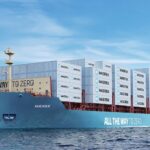- Green ambition: Maersk aims for alternative fuels to power up to 20% of its fleet by 2030, driving toward net zero by 2040.
- Scaling innovation: Dual-fuel methanol vessels and contracts for bio-methanol signal a significant shift in shipping technology.
- Cost challenge: Alternative fuels remain more than twice as expensive as traditional options, presenting financial and logistical hurdles.
Maersk’s bold sustainability push
A.P. Moller-Maersk, a global shipping leader, is targeting up to 20% of its marine fuel consumption to come from alternative sources by 2030. This move is critical to the company’s goal of achieving net-zero emissions by 2040.
“We would probably look at 15% to 20% green fuel or renewable fuel in 2030,” said Emma Mazhari, Maersk’s vice president and head of energy markets. She noted that the success of this shift hinges on advancements in energy efficiency.

Expanding green fuel options
Maersk consumed 10-11 million metric tons of fuel oil equivalent in 2022, with only 3% from alternative fuels. To scale up, the company is focusing on biodiesel, green methanol, and bio-methane.
“Green methanol is going to feature very heavily, and bio-methane as well,” Mazhari emphasized, adding that bio-methane production is growing in Europe and North America, enhancing its viability for LNG-powered ships.
Related Article: Maersk, Lufthansa Cargo Partner to Accelerate Airfreight Decarbonization with SAF
A new fleet for a new era
The company launched its latest dual-fuel methanol vessel, capable of carrying 16,000 cubic meters of methanol—enough to journey from Asia to Europe and back. By the end of next year, 18 such ships will join Maersk’s fleet.
Ditlev Blicher, Maersk’s President for Asia Pacific, acknowledged the challenges: “Alternative fuels cost more than double conventional fuels.”
To bridge the supply gap, Maersk has partnered with China’s LONGi Green Energy Technology to procure bio-methanol starting in 2026. However, with green methanol demand outpacing supply and its lower energy density requiring more fuel volume, scaling up will require significant investment and innovation.
Follow ESG News on LinkedIn
The post Maersk to Use up to 20% Alternative Fuels For its Fleet in 2030 appeared first on ESG News.


